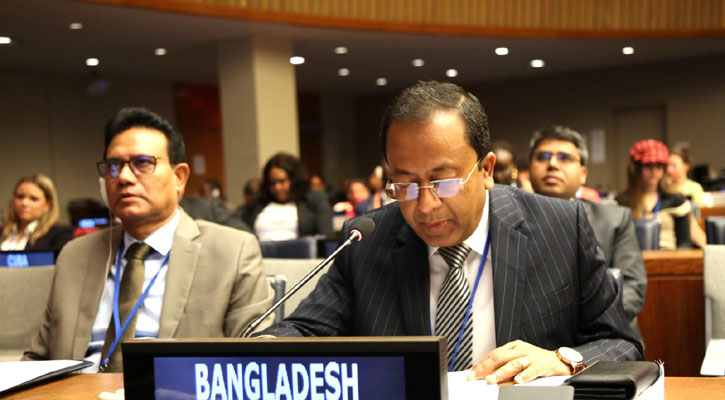At the ongoing 23rd session of the Permanent Forum on Indigenous Issues at the United Nations headquarters in New York, Bangladesh has presented progress on mountainous peace agreements.
On Saturday (April 20), according to Bangladesh’s permanent mission to the United Nations, Secretary of the Ministry of Chittagong Hill Tracts Affairs, Moshiur Rahman, detailed the implementation of the historic ‘Mountainous Peace Accord’ and the government’s initiatives for the development and preservation of unique regional cultures and traditions, as well as the empowerment of indigenous peoples, women, and communities.
In his remarks, he stated that the Constitution of Bangladesh grants equal rights to the people regardless of religion, ethnicity, caste, gender, or place of birth. Under the visionary leadership of Prime Minister Sheikh Hasina, the signing of the historic Chittagong Hill Tracts Peace Accord in 1997 brought an end to decades of conflict in the region and made it possible to integrate the indigenous peoples of the Chittagong Hill Tracts into the mainstream development of the country.
Regarding the implementation of the accord, Moshiur Rahman mentioned that through an inclusive and participatory process, the provisions of the agreement are being implemented. Out of a total of 72 clauses, 65 have already been fully implemented, three have been partially implemented, and four clauses are under implementation.
He further informed the forum about various steps taken by the government for overall development in the region, including ensuring security, protecting environmental sustainability, conducting digital land surveys, and managing land conflicts. Moshiur Rahman also highlighted that the participation of three administrative circle chiefs from the Chittagong Hill Tracts and the election of chairmen and one-third members from indigenous communities in each district council show the government’s commitment to empowering indigenous peoples.
He mentioned that the government has established specialized cultural institutions for the preservation and promotion of the culture, language, and heritage of indigenous communities. Free textbooks are being distributed regularly in their respective languages among children of the five indigenous communities. Additionally, five percent quota is reserved for the recruitment of indigenous candidates in the third and fourth grades of government jobs and in government educational institutions. Currently, four members in the National Parliament and one in the Cabinet represent indigenous communities.
The 23rd session of the Permanent Forum on Indigenous Issues at the United Nations headquarters in New York will continue until April 26, 2024. The Bangladesh delegation, led by Secretary Moshiur Rahman of the Ministry of Chittagong Hill Tracts Affairs, is participating in the forum. The delegation includes representatives from the Prime Minister’s Office, the Ministry of Foreign Affairs, and the Permanent Mission to the United Nations.
It is noteworthy that under the auspices of the United Nations Economic and Social Council, the Permanent Forum on Indigenous Issues works on various issues concerning indigenous peoples worldwide.

